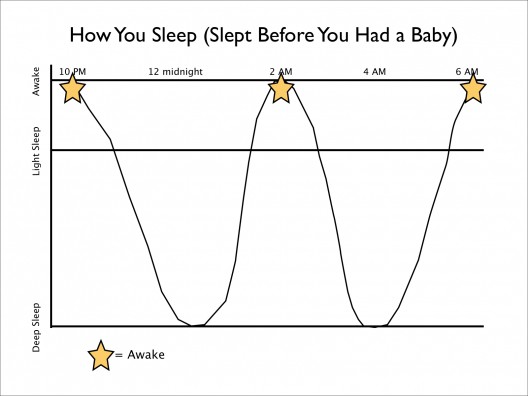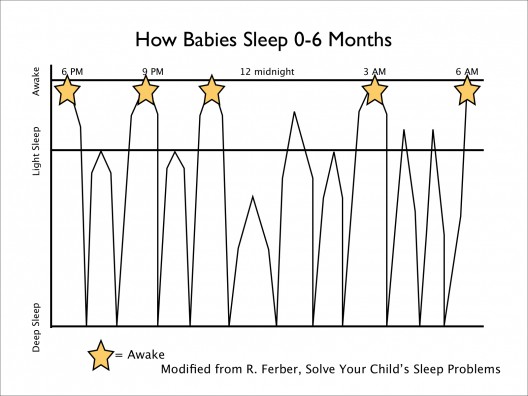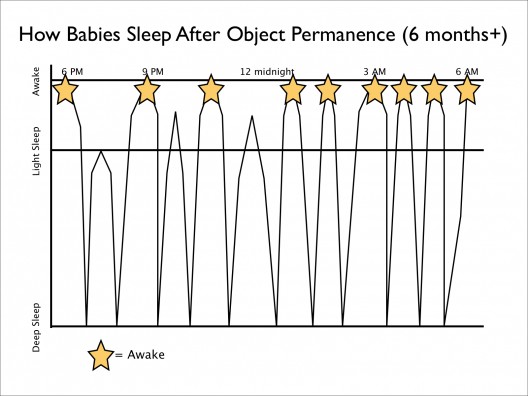After you’ve read 1 or 8 books on baby sleep you may be rightfully confused about why your 8 month+ baby is not sleeping through the night. And while I’ll admit that there are a few reasons why this may be happening 99% of the time there is one single reason why older babies, toddlers, and even preschool kids are still waking up multiple times each night. If you’re ready to sleep through the night you need to understand why they’re waking up and what to do about it.
Teaching Baby to Fall Asleep
You’ve been teaching baby to fall asleep since the very beginning, usually through some combination of nursing and rocking. When they’re younger than 4-6 months nursing, rocking, bouncing to sleep is effective and totally reasonable. While some babies this young will figure out how to sleep through the night most will wake up 2-3 times a night (newborns may wake up 4-6 times but this usually settles down within a few weeks). You feel tired and develop a substantial coffee habit but this is what being the parent of a baby requires and so you do it.
But you are hoping for the night your baby delights and surprises you by sleeping all night long. I mean REALLY all night long (not the crazytown “4 hours in a row” that many sleep books talk about).
Your baby also hasn’t yet mastered how to fall asleep on their own. She still needs to be rocked, nursed, etc. and complains loudly when you deviate from this routine. Some babies are champion sleepers who figure out how to fall asleep on their own. How delightful it must be for these lucky parents of easy babies. These babies sleep often and easily, establish predictable nap schedules, rarely fuss, and poop unicorns.
Most babies are not so easy.
When to Put Baby Down Awake?
For the first 3 months you are welcome to nurse, rock, bounce, etc. your baby to sleep guilt-free. No you don’t want to let your baby become overtired and yes various soothing techniques her fall asleep. But the truth is that you have enormous flexibility to help your baby sleep however and wherever it works best for everybody for the first few months.
The easiest (this, of course, is a relative term) time to work on teaching babies to fall asleep on their own is ~3-6 months of age. If you are the parent of a 3-6 month old you may be thinking, “Um…this isn’t easy at ALL!” For some babies it’s NEVER easy. So maybe you could consider that 3-6 months of age is a time when it will likely be less horrible to teach your baby to fall asleep on their own?
6-9 months is less ideal. Why? Because most babies are starting to get teeth and this brings it’s own night challenges into the equation. Because some babies start developing separation anxiety around this time (8-12 months tends to be the peak) and this can complicate your efforts to put her down and leave the room.
But most importantly, if you haven’t gotten your baby to fall asleep on her own by 6-9 months you are likely to find that your baby who was waking up 2-3 times a night while a newborn has turned into a 6 month old who now wakes up every 45 minutes all night long and if this continues you will willingly shove bamboo shoots up your own fingernails because this would be preferable to another long night of waking up every 45 minutes.
Why You Need to Put Baby Down Awake
Read this carefully. Don’t skim it, ACTUALLY read it. What I’m about to tell you is the single most important thing you need to know about why 99% of babies older than 6 months are crappy sleepers. What I’m about to tell you is the answer to every post on every desperate new-baby forum where desperately exhausted parents are asking questions like:
- My baby used to sleep great and now is up all night. I think he’s teething – help!
- My 8 month old is hungry all night long. I’m afraid my milk is drying up. What can I do to increase milk production?
- 7 month old used to sleep great in the crib but now will only sleep while being held. My back is killing me. How do I get her back into her own bed?
- 9 month old is having terrible separation anxiety and now demands that we come back into his room and rock him all night long. We’re soooo tired. Anybody know when things will get better?
- How do I get my 14 month old baby to sleep through the night?
The answer to all of these questions/challenge is actually THE SAME. The following 2 pieces of information are the missing links that most parents don’t understand and that fundamentally hinder their ability to help their child sleep through the night.
#1 Object Permanence
Most babies develop a new skill around 6 months (give or take a month) called object permanence. Prior to this for babies, out of sight LITERALLY meant out of mind. Now they can remember things, people, etc. exist even when they can’t see them. This is closely linked with stranger/separation anxiety which occurs because now your child actually remembers that you exist when you aren’t physically present. For the first time they are capable of missing you. Which is really sweet but often hard to enjoy. It also means that they are now capable of remembering that you were THERE when they fell asleep but are MISSING when they wake up.
Many of you will know EXACTLY when your child mastered this skill. It was the day your once decently-sleeping baby became a short-napper who wakes up all night long.
#2 – Baby Sleep is Fundamentally Different from Yours
Most nights adult sleepers will wake up ever so slightly ~4 hours after they fell asleep. Usually you fluff your pillow, roll over, and aren’t even really aware that it happens. Unless you’re pregnant in which case this is probably when you make your nightly trip to the bathroom.
Babies wake up all night long. Sometimes they may need your help or a quick meal to fall back asleep. But I promise you that between bedtime and morning your baby wakes up far more often than you know. Beyond the times when they wake YOU up they also cycle into light sleep far more often than adults do. This is roughly how your baby sleeps from 0-6 months of age:
Babies who have not yet developed object permanence can be happily rocked, bounced, or nursed to sleep without issue. They’ll wake up 2-4 times each night to be fed and/or rocked back to sleep. It’s not the most fun thing you’ve ever done but it’s to be expected of newborn babies. So you clutch your coffee with white-knuckled hands and dream of the day your baby sleeps through the night. But putting your baby down 100% asleep will seem like it’s a winning strategy. For now.
But once your baby develops object permanence putting baby down while asleep will almost always blow up on you. Now your baby remembers that when they fell asleep you were there. When they move into light sleep where they used to simply fall asleep on their own, they wake themselves up fully. Because you were there, and now you aren’t. Worse, they’re generally pretty upset. In their own baby world they’re yelling at you saying, “Hey! Where did you go! What happened?”
Let’s put this in perspective. Imagine going to bed in your bedroom. A few hours later you wake up on your front lawn. Would you simply roll over and go back to sleep in the grass? Or would you stand up and start screaming? Would you demand loudly to be let back into the house so that you could sleep in your bed? Do you think you would be freaked out by the mysterious force that somehow carried you out to the lawn?
Your baby is reacting to the surprise of finding out that the circumstances they observed when falling to sleep is no longer the circumstance they are finding when they wake up. There are lots of different surprises that can result in a baby who wakes up all night long.
- Putting baby down 100% asleep
- Pacifier use – fell asleep in mouth, wake up not in mouth
- Mobiles or other timed devices – on when fell asleep, off when wake up
- Music used at bedtime but not played all night long
- Mommy/Daddy stay in room till baby falls asleep but then sneak out
Now you and your baby are up all night. Even worse, their longest window of uninterrupted sleep probably occurs before you even go to bed so now you are literally up all night.
Thus, in children, the first three or four hours of the night are spent mainly in very deep sleep from which the child is not easily aroused. Parents are often aware of this fact, because the period of lighter sleep that follows, with more frequent wakings, may begin at about the time they are going to sleep themselves.
–Solve Your Child’s Sleep Problems Dr. Ferber
The Hurdle to Sleeping Through the Night
Most people don’t understand these two things. They don’t understand what a fundamental shift object permanence is in their baby’s perception of the world. And they don’t understand how different sleep for babies is from our own. So they continue to rock, nurse, etc. baby to sleep. Things are getting worse but they’re desperately clinging to the hope that it’s just a temporary sleep regression. Maybe it’s a tooth that has yet to erupt. Perhaps they just started daycare and are hoping that everybody will settle into the new routine and things will get easier.
They won’t.
If you continue to surprise your baby by changing the circumstances after they fall asleep, you’ll find yourself with a baby who starts to fight falling asleep. They become hyper-vigilant at bedtime because they know that you’re trying to sneak out. Some babies will fight sleep desperately trying to keep an eye on you so you can’t go anywhere. The baby who used to cuddle and laugh with you at bedtime is now agitated and anxious.
Imagine the scenario where you woke up on the front lawn. How many times would this have to happen before you started to struggle to fall asleep in your bed? Before worry about the mysterious alien force that was moving you in your sleep kept you from sleeping AT ALL?
This hypervigillance is completely understandable from their perspective, isn’t it?
So now you’ve added bedtime battles to list of fun things you’re dealing with at night. You’re probably dealing with it during the day too as the surprises that are waking your child up all night are making their naps short during the day. The 4 month old who used to take a 2.5 hour nap is now a 9 month old who never sleeps longer than 45 minutes. And she wakes up miserable and is generally inconsolable for half an hour every time she sleeps.
Of course now that her naps are significantly shorter and she’s getting poor quality sleep at night (because she’s constantly waking up) she’s a lot less fun to be around. As are you, because you are morphing into a bleary-eyed troll who can’t remember where she put the car keys and is so cranky the mailman is afraid to deliver packages to your house.
Ah….good times.
When Does it End?
This ends when you stop surprising your child when they sleep. When you stop rocking them to sleep. Stop nursing them to sleep. Stop cuddling them to sleep and then sneaking out the door. When you stop using any timed device (mobile, music, etc.). When you stop using pacifiers at bedtime.
Your child wakes up many more times a night than you do. The scene they find when they wake up needs to be IDENTICAL to the one they saw when they fell asleep.
When you’re ready to stop shuffling around like a sleep-deprived zombie, you’re going to need to come up with a plan to teach your child to fall asleep and the best way to come up with a plan that works is to get the Precious Little Sleep book.
After you have the book come join the free FB group for support, troubleshooting, and more!




